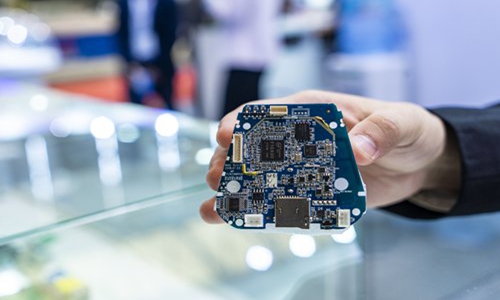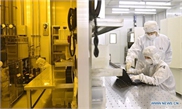SOURCE / INDUSTRIES
5,000 semiconductor lines begin production in Xinjiang

An employee showcases a semiconductor integrated circuit at an industry expo on October 31. Photo: VCG
The 5,000 semiconductor chip test production lines with a total investment of 10 billion yuan ($1.42 billion) have begun production in Horgos, China's Xinjiang Uygur Autonomous Region. Experts believe they will create more opportunities to boost the regional advancement of the semiconductor sector.The Horgos Sanyou Fuxin Optoelectronic Semiconductor Industrial Park project was officially launched in the Horgos Industrial Park on July 8. After entering production, the lines will realize an annual output of 24 billion semiconductors and electronic components, according to an official report from the Xinjiang government on July 9.
It is expected that the sales revenues of the newly established industrial park will exceed 10 billion yuan in three years, with profits and taxes of 1 billion yuan, and will create 3,000 jobs to build Horgos into Xinjiang's own "Silicon Valley," the report said.
"China has advanced capabilities and experiences in the development and production of semiconductors, including chip testing, and it is not difficult for the country to build more production lines of this magnitude," industry analyst Xiang Ligang told the Global Times on Tuesday.
Analysts say the new production lines are a good trial for the diversification and transformation of the regional industry toward technological innovation.
Furthermore, Song Guoqiang, chief financial officer of Horgos Sanyou Fuxin Semiconductor Co, said the project will be a driver for 16 upstream and downstream enterprises to settle down in the region, and that number may increase to 100 when the project is fully put into operation, according to articles on the website of the People's Daily on July 9.
Founded in May 2020, the company's business scope includes semiconductor electronic components, field effect tubes, integrated circuits, photoelectric product design, research and development, and the production and sales of electronic products, data from Chinese corporate database Tianyancha showed.
"We plan to enter five Central Asian countries, Russia and the European market to gain a share in the global semiconductor industry," Song said.

